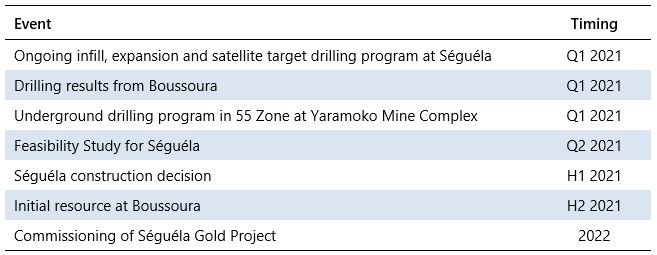Roxgold Intercepts 42.9 gpt Over 14m & 46.2 gpt Over 11m at Koula as Séguéla Continues to Advance
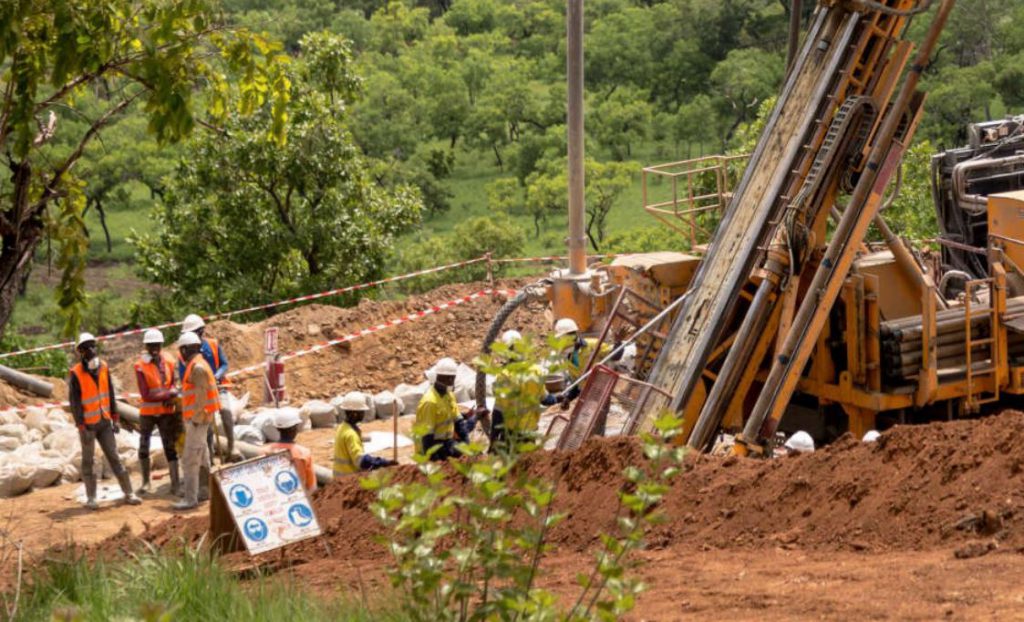
The Séguéla Gold Project is located in Côte d'Ivoire and was acquired by Roxgold in April 2019 as part of a portfolio comprised of 11 regional exploration permits. The total land package is approximately 3,298km2 including the advanced exploration Séguéla gold project that hosts the near surface Antenna gold deposit, which was discovered in 2016. Source: Roxgold Inc.
Roxgold Inc. (“Roxgold” or the “Company”) (TSX: ROXG) (OTCQX: ROGFF) is pleased to announce additional results from the newest high grade deposit, Koula, at the Séguéla Gold Project (“Séguéla”) located in Côte d’Ivoire.
Séguéla Gold Project, Côte d’Ivoire:
Highlights from Reverse Circulation (“RC”) and Diamond tail (“RD”) drilling
Koula
- 14 metres (“m”) at 42.9 grams per tonne gold (“g/t Au”) in drill hole SGRD1000 from 61m including
- 3m at 83.7 g/t Au from 62m and
- 1m at 263.0 g/t Au from 67m and
- 1m at 46.1 g/t Au from 74m
- 11m at 46.2 g/t Au in drill hole SGRC799 from 48m including
- 3m at 143.6 g/t Au from 48m and
- 2m at 36.5 g/t Au from 57m
- 18m at 22.1 g/t Au in drill hole SGRD800 from 175m including
- 7m at 40.1 g/t Au from 176m and
- 1m at 32.8 g/t Au from 186m
- 16m at 21.3 g/t Au in drill hole SGRC982 from 174m including
- 2m at 82.0 g/t Au from 177m
- 24m at 8.6 g/t Au in drill hole SGRD978 from 185m including
- 1m at 63.9 g/t Au from 206m
- 21m at 9.2 g/t Au in drill hole SGRD1022 from 160m including
- 3m at 39.1 g/t Au from 166m
“It has been remarkable to see the advancement of the Koula deposit since announcing its discovery in September of last year,” stated John Dorward, President and Chief Executive Officer. “Today’s results continue to demonstrate Koula’s ability to add significant value to the Séguéla Gold Project, through its ongoing expansion and the high grade tenor of mineralization. Furthermore, these results support the recent Séguéla Mineral Resource update, in which the Koula deposit had a maiden inferred resource of 281,000 ounces at an impressive 8.1 g/t giving it the potential to be one of the highest grade open pits in West Africa. We currently have 4 rigs at Koula continuing to conduct infill and extension drilling as the deposit remains open along strike and at depth.
“Since acquiring Séguéla in April 2019, we have seen the project grow at a rapid pace to over a million ounces of Indicated and an additional 370,000 ounces of Inferred Mineral Resources today. We continue to believe we have only begun to tap the potential of the Séguéla Project and are eager to continue to uncover and test the wealth of additional targets present on the property. While our accomplished exploration team continues their work at Séguéla, the critical path for the Séguéla project plan is on track with the Feasibility Study scheduled for the second quarter of this year, followed soon thereafter by a construction decision towards the goal of achieving first gold pour at Séguéla in 2022.”
Paul Weedon, Vice President Exploration commented “These excellent results from the infill drilling at Koula, such as 14m at 42.9 g/t from 61 metres down-hole in SGRD1000, 11m at 46.2 g/t Au from 48 metres down-hole in SGRC799, and 18m at 22.1 g/t Au from 175 metres down-hole in SGRD800, continue to emphasise the high grade nature of the deposit. With drilling continuing and the deposit open down plunge, I’m looking forward to seeing the continued growth at Séguéla.”

Koula
Located approximately 1km to the east of Antenna, Koula was discovered through field reconnaissance and coincident recent artisanal workings in an area previously considered to be a lower exploration priority. A 4 rig infill program of RC and diamond drilling is 80% complete with the primary objective of infilling the deposit to 25m centres to support an upgraded Indicated classification. This further supports its rapid advancement and inclusion in the forthcoming Feasibility Study.
Mineralization is hosted by quartz-carbonate veining associated with a well developed mylonitic fabric within and along the interpreted margins of a tholeiitic basalt which in turn has been tightly folded. Coarse gold is commonly recorded in the higher grade zones, with drilling highlighting a consistent moderate southerly plunge to the high grade core over at least 350m, and where it remains open to the south with hole SGRD971 intersecting 14m at 4.3 g/t Au from 273m downhole.
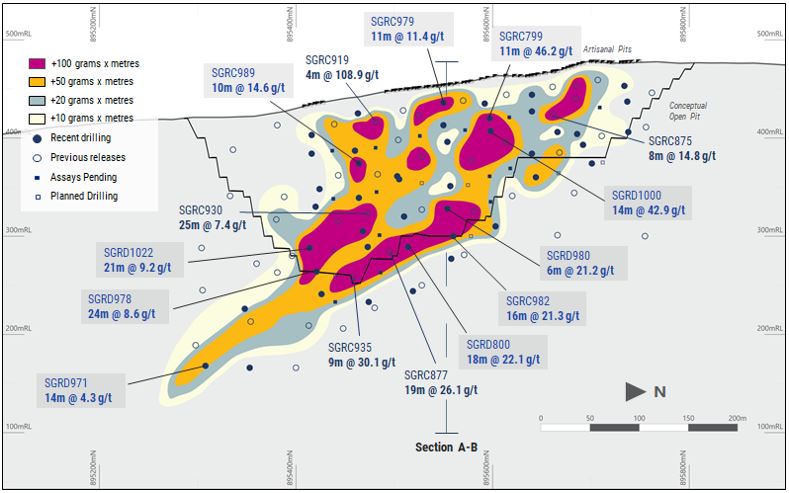
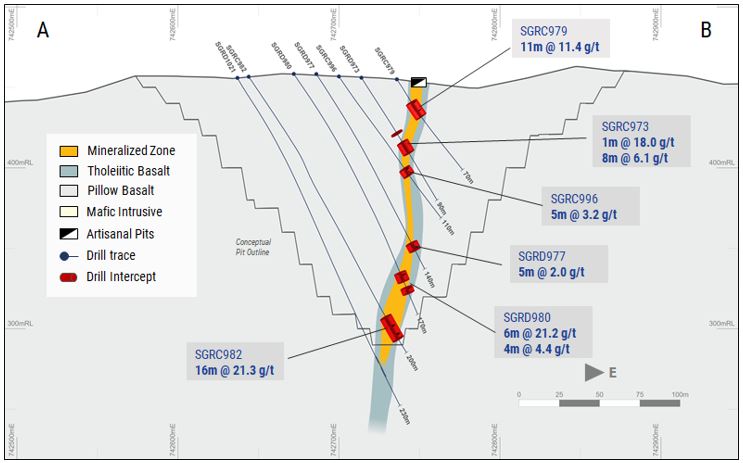
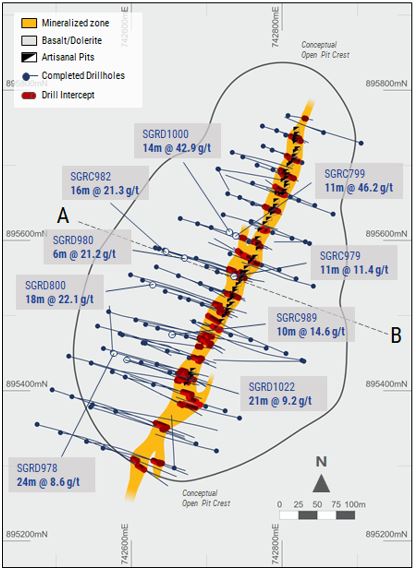
Highlights from the Indicated infill drilling program at Koula include:
- 14 metres (“m”) at 42.9 grams per tonne gold (“g/t Au”) in drill hole SGRD1000 from 61m including
- 3m at 83.7 g/t Au from 62m and
- 1m at 263.0 g/t Au from 67m and
- 1m at 46.1 g/t Au from 74m
- 11m at 46.2 g/t Au in drill hole SGRC799 from 48m including
- 3m at 143.6 g/t Au from 48m and
- 2m at 36.5 g/t Au from 57m
- 18m at 22.1 g/t Au in drill hole SGRD800 from 175m including
- 7m at 40.1 g/t Au from 176m and
- 1m at 32.8 g/t Au from 186m
- 16m at 21.3 g/t Au in drill hole SGRC982 from 174m including
- 2m at 82.0 g/t Au from 177m
- 24m at 8.6 g/t Au in drill hole SGRD978 from 185m including
- 1m at 63.9 g/t Au from 206m
- 21m at 9.2 g/t Au in drill hole SGRD1022 from 160m including
- 3m at 39.1 g/t Au from 166m
- 10m at 14.6 g/t Au in drill hole SGRC989 from 74m including
- 2m at 39.0 g/t Au from 74m
- 6m at 21.2 g/t Au in drill hole SGRD980 from 142m including
- 2m at 55.2 g/t Au from 145m
- 11m at 11.4 g/t Au in drill hole SGRC979 from 17m including
- 3m at 35.2 g/t Au from 18m
Click here to view the full listing of drill results from the recent drilling programs at the Séguéla Gold Project. Note: all results are reported as down-hole intervals, with true widths representing approximately 60% of down-hole widths.
Catalysts and Next Steps
Quality Assurance/Quality Control
All drilling data completed by Roxgold utilized the following procedures and methodologies. All drilling was carried out under the supervision of Roxgold personnel.
RC drilling used a 5.25 inch face sampling pneumatic hammer with samples collected into 60 litre plastic bags. Samples were kept dry by maintaining enough air pressure to exclude groundwater inflow. If water ingress exceeded the air pressure, RC drilling was stopped, and drilling converted to diamond core tails. Aircore (“AC”) drilling was collected in one metre intervals and sampled in a similar fashion to RC methods. Once collected, RC and AC samples were riffle split through a three-tier splitter to yield a 12.5% representative sample for submission to the analytical laboratory. The residual 87.5% sample were stored at the drill site until assay results were received and validated. Coarse reject samples for all mineralized samples corresponding to significant intervals are retained and stored on-site at the Company controlled core yard.
DD drill holes were drilled with HQ sized diamond drill bits. The core was logged, marked up for sampling using standard lengths of one metre. Samples were then cut into equal halves using a diamond saw. One half of the core was left in the original core box and stored in a secure location at the Company core yard at Séguéla. The other half was sampled, catalogued and placed into sealed bags and securely stored at the site until shipment.
All Séguéla RC, AC and DD core samples were shipped to ALS Laboratories preparation laboratory in Yamoussoukro for preparation. Samples were dried and crushed by the Lab and a 250-gram split prepared from the coarse crushed material, prior to pulverization and preparation of a 200g sample. Samples are then shipped via commercial courier to ALS’s analytical facility in Ouagadougou, Burkina Faso where routine gold analysis using a 50-gram charge and fire assay with an atomic absorption finish was completed. Quality control procedures included the systematic insertion of blanks, duplicates and sample standards into the sample stream. In addition, the Lab inserted its own quality control samples.
For more information on the Company’s QA/QC and sampling procedures, please refer to the Company’s Annual Information Form for the year ended December 31, 2019, available on the Company’s website at www.roxgold.com and on SEDAR at www.sedar.com.
Qualified Person
Paul Weedon, MAIG, Vice-President, Exploration for Roxgold Inc., a Qualified Person within the meaning of National Instrument 43-101, has reviewed and approved the scientific and technical disclosure contained in this news release, including the QA/QC, sampling, analytical and test data underlying this information. Mr. Weedon verified the information in the news release by reviewing the drill logs, geological interpretations and supporting analytical data. No limitations were imposed on Mr. Weedon’s verification process.
Roxgold’s disclosure of Mineral Reserve and Mineral Resource information is governed by NI 43-101 and under the guidelines set out in the Canadian Institute of Mining, Metallurgy and Petroleum (“CIM”) Standards on Mineral Resources and Mineral Reserves, adopted by the CIM Council, as may be amended from time to time by the CIM. There can be no assurance that those portions of Mineral Resources that are not Mineral Reserves will ultimately be converted into Mineral Reserves.
For more information on the Séguéla Gold Project please refer to the Company press release titled “Roxgold Increases Indicated Mineral Resources by 97% to Over 1 Million Ounces at Séguéla; Reports Maiden Inferred Mineral Resource at Koula of 281,000 oz at 8.1 gpt Au” dated December 14, 2020; and the Company’s technical report entitled “NI 43-101 Technical Report, Séguéla Project, Preliminary Economic Assessment, Worodougou Region, Cote d’Ivoire” dated April 14, 2020, each available on the Company’s website at www.roxgold.com and SEDAR at www.sedar.com.
About Roxgold
Roxgold is a Canadian-based gold mining company with assets located in West Africa. The Company owns and operates the high-grade Yaramoko Gold Mine located on the Houndé greenstone belt in Burkina Faso and is advancing the development and exploration of the Séguéla Gold Project located in Côte d’Ivoire. Roxgold trades on the TSX under the symbol ROXG and as ROGFF on OTCQX.
For more information, contact:
Roxgold Inc.
Graeme Jennings, CFA
Vice President, Investor Relations
416-203-6401
gjennings@roxgold.com
Cautionary Note Regarding Forward-Looking Statements
This news release contains “forward-looking information” within the meaning of applicable Canadian securities laws (“forward-looking statements”). Such forward-looking statements include, without limitation: economic statements related to the PEA, such as future projected production, capital costs and operating costs, statements with respect to Mineral Reserves and Mineral Resource estimates, recovery rates, timing of future studies including the feasibility study, environmental assessments and development plans. These statements are based on information currently available to the Company and the Company provides no assurance that actual results will meet management’s expectations. In certain cases, forward-looking information may be identified by such terms as “anticipates”, “believes”, “could”, “estimates”, “expects”, “may”, “shall”, “will”, or “would”. Forward-looking information contained in this news release is based on certain factors and assumptions regarding, among other things, the PEA, the estimation of Mineral Resources and Mineral Reserves, the realization of resource estimates and reserve estimates, any potential upgrades of existing resource estimates, gold metal prices, the timing and amount of future exploration and development expenditures, the estimation of initial and sustaining capital requirements, the estimation of labour and operating costs, the availability of necessary financing and materials to continue to explore and develop the Company’s properties in the short and long-term, the progress of exploration and development activities, the receipt of necessary regulatory approvals, and assumptions with respect to currency fluctuations, environmental risks, title disputes or claims, and other similar matters. While the Company considers these assumptions to be reasonable based on information currently available to it, they may prove to be incorrect.
Although the Company believes the expectations expressed in such forward-looking statements are based on reasonable assumptions, such statements are not guarantees of future performance and actual results or developments may differ materially from those in the forward-looking statements. Factors that could cause actual results to differ materially from those in forward-looking statements include: delays resulting from the COVID-19 pandemic, changes in market conditions, unsuccessful exploration results, possibility of project cost overruns or unanticipated costs and expenses, changes in the costs and timing of the development of new deposits, inaccurate reserve and resource estimates, changes in the price of gold, unanticipated changes in key management personnel and general economic conditions. Mining exploration and development is an inherently risky business. Accordingly, actual events may differ materially from those projected in the forward-looking statements. This list is not exhaustive of the factors that may affect any of the Company’s forward-looking statements, including the factors included in the Company’s annual information form for the year ended December 31, 2019. These and other factors should be considered carefully and readers should not place undue reliance on the Company’s forward-looking statements. The Company does not undertake to update any forward-looking statement that may be made from time to time by the Company or on its behalf, except in accordance with applicable securities laws.

